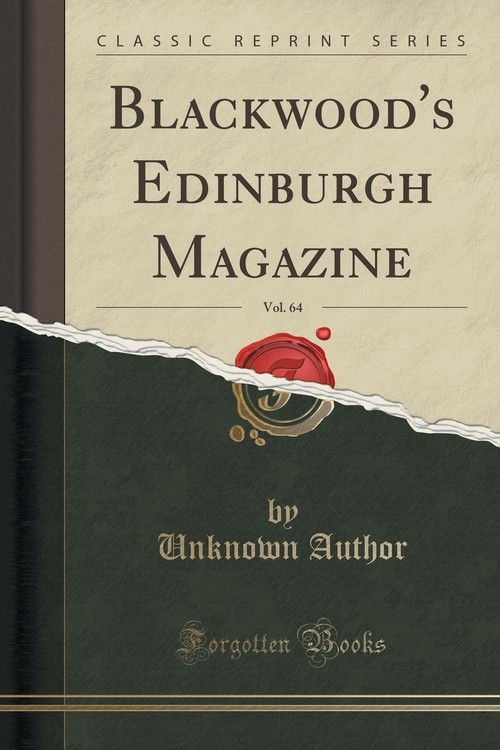Blackwood's Edinburgh Magazine, Vol. 64 (Classic Reprint)
Author Unknown
Blackwood's Edinburgh Magazine, Vol. 64 (Classic Reprint)
Author Unknown
- Wydawnictwo: FB &c Ltd
- EAN: 9781331529903
- Ilość stron: 778
- Format: 15.2x22.9cm
- Oprawa: Miękka
Niedostępna
Opis: Blackwood's Edinburgh Magazine, Vol. 64 (Classic Reprint) - Author Unknown
Excerpt from Blackwood's Edinburgh Magazine, Vol. 64
We must, we suppose, look for the text of the work, not where the text is usually found, but at the end. The following sentence, which is almost the concluding one, may be taken as the leading proposition of the work: -
"A powerful and widely-ramified aristocracy like that of England, not resting for support on any oppressive laws, and enjoying no privileges but which are for the public advantage, is necessary to give stability and security to the government, and freedom to the people. And our laws in regard to succession being well fitted to maintain such an aristocracy, and, at the same time, to inspire every other class with the full spirit of industry and enterprise, to change them would not be foolish merely, but criminal, - a lse majest against the public interests." - P. 172.
It must not, however, be supposed from this remark, that any portion of the work is appropriated to a set defence of government by means of an aristocracy. By an aristocracy we mean the deposition of political power in the hands of men of leisure and education, as opposed to the tendency of the Reform Bill, to transfer the governing functions to the "practical" men of the trading and moneyed interests, and the analogous claims of Chartism, founded on Jack Cade's complaint, that the "king's council are no good workmen." In England, we are pretty sure to have an aristocracy - that is, the influences which affect government and legislation will emanate principally from that class which is socially at the head of the nation; and the question is, whether we are to have a mere moneyed aristocracy, or one qualified by those mixed and undefinable conditions which, more than any thing else, act to keep down the growing and eager ascendency of wealth per se. Among the safeguards of such an aristocracy as we have described, not the least powerful is to be found in the laws discussed in the work before us. Mr M'Culloch, as we have said, assumes the importance to the country of preserving the present characteristics of British aristocracy; and he therefore proceeds at once to show how the laws on which he treats operate for this preservation, and to rebut the objections advanced against them on the score of their relations to other classes of the community.
One of the most frequent of these objections is, that the laws in question tend to diminish the productiveness of the land, and thereby inflict a serious injury on the community at large; that they prevent, in many instances, the landlord from granting leases to his tenant beyond the term of his own life; that the tenant, in consequence, is not willing to incur the outlay of drainage and other expensive improvements, because he is not secured by a lease; while the landlord, on the other hand, will not enter into these expenses, because he does not feel the same interest in his limited estate which he would in the unconditional fee-simple.
Note first of all the logic of this argument. The tenant, it seems, will not spend his money in draining without a lease. As, however, a lease would suffice to induce him so to do, we might naturally suppose that the landlord's estate for life, or in tail, would be at least an equal inducement. These reasoners, however, aver, that the landlord is only to be tempted by the unrestricted fee. According to this progressive scale, it might be fairly argued, that the tenant, on becoming lessee for years, would still require the landlords life-interest; and the latter, when seised of the fee, would decline the requisite expense, except on a guarantee of immortality, and justify himself by Horace's authority,-
"Tanquam Sit proprium quidquam puncto quod mobilis hor
Pennutet dominos, et cedat in altera jura."
But the general scope of an argument may be just, though clumsily stated and fallaciously supported. We are, however, at no loss for experiments on the largest s
Szczegóły: Blackwood's Edinburgh Magazine, Vol. 64 (Classic Reprint) - Author Unknown
Nazwa: Blackwood's Edinburgh Magazine, Vol. 64 (Classic Reprint)
Autor: Author Unknown
Wydawnictwo: FB &c Ltd
Kod paskowy: 9781331529903
Języki: angielski
Ilość stron: 778
Format: 15.2x22.9cm
Oprawa: Miękka






















